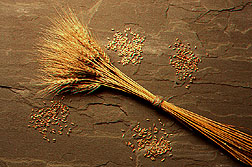A recent study by researchers at Kansas State University looked at wheat yields in areas across the world to see how temperatures affected the yields of the popular crop.
For the study, researchers systematically tested 30 wheat crop models against field experiments from around the world that were conducted in areas where the average temperature of the growing season ranged from 15 to 32 degrees Celsius. The models accounted for planting dates, planting rates, temperatures and other crop management factors.
They found that for each 1 degree Celsius increase in temperature (about 2 degrees F), yield is reduced by about 6 percent. The researchers found that it was not the gradual increase in temperatures that caused most of the problems, since farmers can adapt to that with management and good choice of variety, but due to extreme heat and cold weather. You can read a story about the study at the Summit County Voice here.
In a related story, AgWeb reported that Kansas crop values are significant down this year due to a combination of drought and market pressures. The story is located here.
